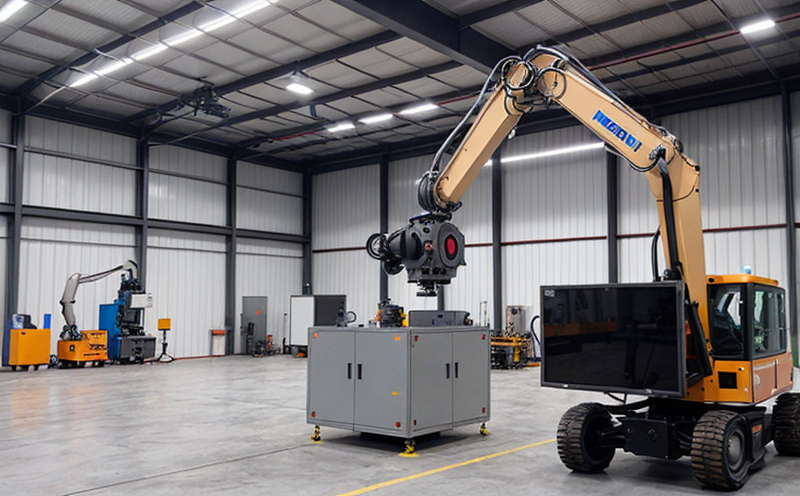ASTM F2560 Collision Detection and Avoidance in Manufacturing Robots
The ASTM F2560 standard is a critical benchmark for ensuring that industrial robots used in manufacturing environments are equipped with robust collision detection and avoidance systems. This standard ensures that robotic systems can operate safely within shared spaces, reducing the risk of accidents and damage to both machinery and personnel.
Manufacturing robotics has seen significant growth, particularly in sectors like automotive, electronics, and aerospace, where precision and efficiency are paramount. However, this rapid expansion also brings challenges, especially regarding safety. ASTM F2560 addresses these concerns by providing a standardized method for testing the collision detection and avoidance capabilities of industrial robots.
The standard focuses on several key aspects:
- Collision detection: Ensuring that the robot can identify potential collisions with objects or people in its environment.
- Avoidance strategies: Implementing effective strategies to prevent such collisions by adjusting the robot's path or movement.
The testing process outlined in ASTM F2560 is designed to evaluate these critical features. It involves simulating various scenarios where a collision might occur, and assessing how well the robot responds. This includes:
- Testing under different load conditions: Ensuring robustness across varying workloads.
- Evaluating performance in dynamic environments: Assessing adaptability to changing circumstances.
The standard also emphasizes the importance of real-world applicability, ensuring that the tests reflect practical scenarios. This holistic approach ensures that manufacturers can rely on ASTM F2560-compliant robots for safe and efficient operations.
For quality managers and compliance officers, this means having a clear roadmap to ensure their robotic systems meet safety standards. R&D engineers benefit from the detailed guidelines provided by ASTM F2560, allowing them to innovate within a framework that prioritizes safety. Procurement teams can leverage this standard to select suppliers who meet these stringent requirements.
The implementation of ASTM F2560 in manufacturing robotics not only enhances safety but also contributes to broader industrial goals. By reducing accidents and downtime, it supports continuous improvement in production processes. This aligns with the overall trend towards more efficient and safer workplaces.
Eurolab Advantages
At Eurolab, we pride ourselves on providing comprehensive testing services that are second to none. Our expertise in robotics and artificial intelligence systems ensures that our clients receive accurate and reliable results every time. Here's why choosing us for ASTM F2560 compliance is a smart move:
- State-of-the-art facilities: Equipped with the latest technology, our labs offer precise testing environments.
- Experienced professionals: Our team comprises experts in robotics and AI who understand the nuances of ASTM F2560.
- Comprehensive report generation: We provide detailed reports that not only meet but exceed industry expectations.
- Cost-effectiveness: By offering competitive rates, we ensure that our services are accessible to all clients.
We understand the importance of timely results. That's why we strive to deliver accurate and comprehensive reports within a short turnaround time. Our commitment to excellence ensures that your robotic systems are always up to standard, promoting trust and reliability in every project.
Quality and Reliability Assurance
In the realm of manufacturing robotics, quality and reliability assurance play pivotal roles. Ensuring that a robot can reliably detect and avoid collisions is not just about compliance with ASTM F2560; it's about enhancing overall system performance. Here are some key aspects:
- Consistent performance: Testing ensures that the collision detection systems work consistently across different operational scenarios.
- Error minimization: Reliable systems minimize errors, leading to more efficient operations and fewer incidents.
- Ongoing improvements: Regular testing allows for continuous refinement of robotic systems, ensuring they stay ahead of safety standards.
The robustness of ASTM F2560 in this context cannot be overstated. It sets a benchmark that all manufacturers must meet to ensure their robotics are not only safe but also dependable. By adhering to these standards, we contribute to the ongoing improvement and reliability of robotic systems across various industries.
Environmental and Sustainability Contributions
The benefits of ASTM F2560 extend beyond immediate safety; they have broader implications for environmental sustainability and industrial efficiency. By ensuring that robots can operate safely in shared spaces, we reduce the risk of accidents, which in turn minimizes downtime and resource waste.
Robots equipped with robust collision detection systems can work more efficiently, leading to reduced energy consumption and lower carbon footprints. This aligns with global efforts towards sustainability and responsible environmental stewardship. In manufacturing environments, this translates to a more sustainable production process that contributes positively to the environment.
The testing process not only ensures compliance but also promotes innovation in robotics technology. By adhering to high standards like ASTM F2560, manufacturers can push the boundaries of what is possible with industrial robots. This leads to smarter and greener manufacturing practices that benefit both businesses and the planet.





